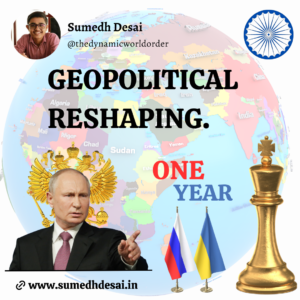After the crisis broke out in Ukraine in 2014, the Russian energy industry faced sanctions from the West.
The Russian leadership envisioned a geopolitical moment wherein they would be denied entry into European energy markets. This moment came in February 2022 when hell broke loose in Ukraine.
The backup plan the Russians had was to shift their energy market’s attention to capture Asian markets. China, India, South Korea, Japan, Singapore etc. are energy consuming giants of Asia. Russia planned on diversifying its energy exports to these consumers.
As we know that today’s energy market is primarily a buyer’s market, hence, cheap Russian energy which was previously only available to the European economies was now made available to Asian economies as well.
The Russians planned to attract investments in upstream, midstream and downstream infrastructure for their Siberian energy reserves in Far East. Another facet of the strategy includes proposing energy pipelines from Russia to Asia transiting Central Asia (which would benefit from the transit fees). The Russians are also looking at helping Iranians evade sanctions with swapping mechanisms and build deep undersea pipelines (Iran to India) etc.
Russia is also looking at connecting Russia to the TAPI pipeline (Turkmenistan-Afghanistan-Pakistan-India) making it the R-TAPI pipeline. For this, they are engaging Afghanistan and Pakistan, both of whom will get transit fees, but are prone to immense security challenges owing to the widespread lawlessness prevailing in the region.
The grand vision of Russia is to integrate the three big powers of Asia through a pipeline – The Russia-China-India pipeline. Based on the Primakov Doctrine, Russia’s grand security interests lie in formulating an Asian Energy Grid integrated between all the 3 – RCI.
Russia is diversifying its markets and looking at breaking the hegemony of $ over global energy market, right from investments, technology, finance etc. across all the upstream, midstream and downstream phases of hydrocarbons sectors. Natural Gas and pipelines play a big role in Russia’s plans to de-dollarise the global energy trade as well as integrating the Eurasian landmass on the Russian concept of “Eurasianism”.




